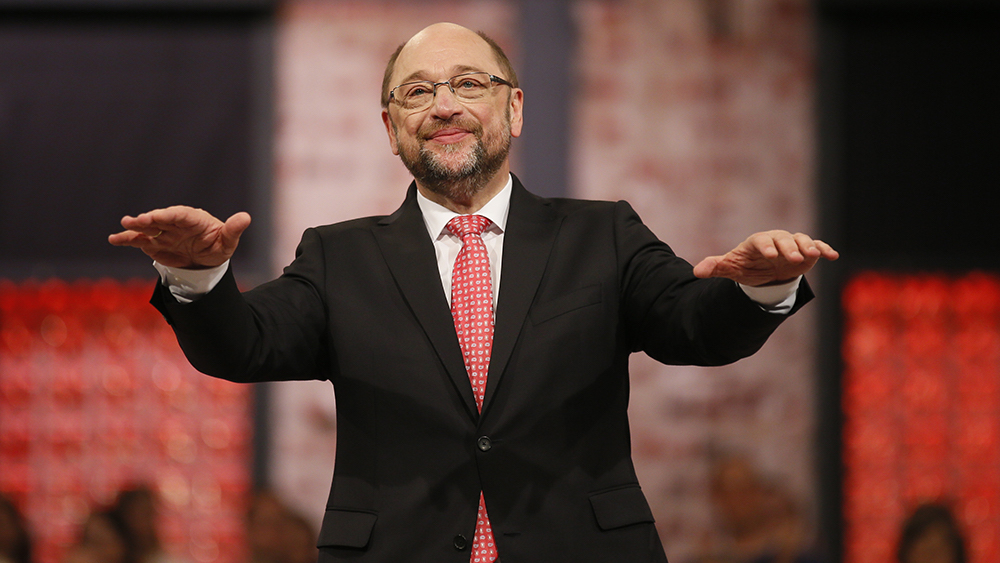With Martin Schulz as the Social Democratic candidate, the German federal election campaign has become unexpectedly exciting. But other than Merkel’s ouster, it’s difficult to say exactly what the former president of the European Parliament wants.
Sitting in a windowless, wood-paneled hall in Berlin’s Social Democratic Party (SPD) headquarters, the newest leader of Germany’s oldest political party has great plans for September.
Half a dozen times in his 50 minute meeting with the foreign press, Martin Schulz lets his dream job title – Chancellor Martin Schulz – escape his lips. German voters go to the polls in September and, bespectacled eyes on the prize, the bearded 61-year-old is using a meeting with the foreign press to outline plans for Germany and Europe that are as grand as his plans for himself.
Though they lack detail now, he has six months to fill in the blanks. And what Schulz lacks in detail he makes up in self-belief, the secret sauce of political power and election victories, the ingredient Germany’s SPD ran out of in 2005. Limping along since then – twice as junior grand coalition partner, once in opposition – the SPD has been a sorry sight. But no more: Schulz, parachuted in from the European Parliament, where he last served as president, is here to turn things around.
And with his party now breathing down the neck of Angela Merkel’s Christian Democratic Union (CDU) in polls, Germany’s political juices are flowing once again.
After twelve years of alternativlos – alternative-less – Merkelian leadership, Schulz is presenting himself as a Merkel alternative with an anti-Trump, yet clearly Trumpian, twist: he is positioning himself as a man running for the forgotten people “who keep the lights on” in Germany. The economy is booming, but the SPD leader wants to tweak the social reforms of recent years to make Germany “fair” again.
While his team works on a political program, Schulz has already flagged two promises that will have consequences far beyond Germany’s borders. First: a plan to prioritize social spending over defense spending.
In a clear snub to US president Donald Trump, who has attacked European NATO members’ defense under-spending as freeloading, Schulz disputed the terms of Germany’s commitment to boost spending to two percent of economic output. At their Cardiff meeting in 2014, NATO leaders signed off on an “aim to move towards the 2 percent guideline within a decade.” But Schulz argues that this “aim” is secondary to the SPD’s twin traditions of social spending and disarmament.
Spending 2 percent of economic output on defense, amounting to “€20 billion or more in the coming years” would, he said, bring a “considerable financial burden” to Germany. “This is certainly not the goal my government would follow,” he said. “What we need is not rearmament but a disarmament spiral, and much more investment in prevention.”
Instead of spending money on a new arms race, he said Germany would be better off investing in its creaking infrastructure, its schools and its welfare system. All have taken a hit in the last years to balance the federal budget and shoulder crisis costs, but SPD strategists sense the mood has shifted – in Germany and in Europe.
Second, on EU policy, the ex-European Parliament president insists he wouldn’t “play the game where everything good is national and everything bad is from Brussels.” Instead, SPD analysis shows there are many voters – particularly younger supporters – shaken by Brexit and Trump’s election and open to the idea of EU politics with a greater emphasis on solidarity.
“A focus not just on stability, but also growth stimulation is necessary in all member states,” he said.
The Same Coin
The mantra of the SPD leader: growth and stability are two sides of the same coin, and neither can be ignored. But EU high-austerity policies of the last years need to be complemented with a new social component.
It’s an argument Schulz inherited from his predecessor as party leader, Sigmar Gabriel. What the SPD has lacked to date, though, is a concrete blueprint for how it plans to deliver this new brand of social politics. In Germany, that would mean challenging the “debt sinner” narrative used during the crisis by Merkel and allies to justify social spending cuts, while sparing banks, in exchange for bailout loans.
If Schulz has a grand strategy on this front, he’s not telling us yet. Instead, he told foreign journalists somewhat cryptically that, with allies struggling everywhere except Germany, social democracy would only survive if it adapted and followed the advice of ex-SPD leader Willy Brandt: “Every era needs its own specific answers.”
Specific answers are also in short supply when it comes to Schulz’s favored coalition partners. His desire to keep his options open has allowed the CDU to claim that a vote for the Schulz SPD is a vote for the Left Party, the successors to East Germany’s communists. Asked if fears over such a taboo-breaking alliance cost the SPD votes in a recent state poll in Saarland, and might do so again in September, Schulz says: “No, I don’t.”
Promising change but so far keeping it vague has given the SPD the kiss of life. And say what you want about Martin Schulz: the man hoping to oust Angela Merkel is not short of confidence. And that, as they say in Germany, is half the job.







